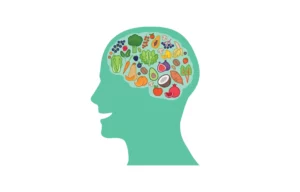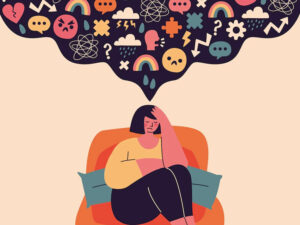Did you know that ADHD and eating disorders often go hand in hand? In fact, it is not uncommon for people who suffer from ADHD to also struggle with an eating disorder. This can be a difficult combination to deal with, as both conditions require specialized treatment. In this blog post, we will explore the relationship between ADHD and eating disorders, and discuss how they affect each other. We will also provide tips on how to cope with this difficult combination.
Contents
What Is ADHD?
 When we say ADHD, our mind instantly thinks of a kid who can’t focus in school and is always bouncing off the walls. While this may be true for some children with ADHD, it is important to remember that this condition can also affect adults. It is observed that most of the people with ADHD also have an eating disorder. There are three types of ADHD, namely:
When we say ADHD, our mind instantly thinks of a kid who can’t focus in school and is always bouncing off the walls. While this may be true for some children with ADHD, it is important to remember that this condition can also affect adults. It is observed that most of the people with ADHD also have an eating disorder. There are three types of ADHD, namely:
- Inattentive type: This is when a person has trouble paying attention and is easily distracted.
- Hyperactive-impulsive type: This is when a person is always moving and finds it hard to sit still. They may also act without thinking.
- Combined type: This is when a person has both inattentive and hyperactive-impulsive symptoms.
It is important to remember that ADHD is a real medical condition that can affect people of all ages. It is not simply a case of someone being “lazy” or “disorganized.” If you or someone you know is struggling with ADHD, it is important to seek professional help.
What Are Eating Disorders?
Eating disorders are more than just a skinny girl not eating enough food. Eating disorders come in all shapes and sizes, and can affect anyone, regardless of their weight or size. There are many different types of eating disorders, but the three most common are:
- Anorexia nervosa: This is when a person starves themselves in order to lose weight.
- Bulimia nervosa: This is when a person binge eats, and then purges the food by vomiting or using laxatives.
- Binge eating disorder: This is when a person eats large amounts of food in a short period of time, and feels out of control during the binge.
Eating disorders are serious mental illnesses that can have a devastating effect on a person’s life.
How Does ADHD Impact Eating Disorders?
 You may be wondering what inattention and hyperactivity have to do with eating. However, it is important to remember that our physiology and psychology co-exist. Any imbalance in the former can impact the latter. With that being said, let us learn how ADHD effects eating disorders.
You may be wondering what inattention and hyperactivity have to do with eating. However, it is important to remember that our physiology and psychology co-exist. Any imbalance in the former can impact the latter. With that being said, let us learn how ADHD effects eating disorders.
- Firstly, people with ADHD are more likely to have an eating disorder. This is because they often suffer from impulsivity, which can lead to binge eating or purging.
- Additionally, people with ADHD may also struggle with compulsive overeating. This means that they eat even when they are not hungry. They may also do so to regulate their out-of-the-wheel emotions and feed their ADHD.
- Another similarity between the two disorders is compulsiveness. This means that people with ADHD often feel the need to do things perfectly. This can lead to orthorexia, which is an obsession with healthy eating. People with orthorexia may also become fixated on the calorie content of food and often avoid eating out.
- Another very strange and unique symptom is the relationship between ADHD and time. People with ADHD often feel as though they do not have enough time to eat. This can lead to them skipping meals or not eating enough.
- Furthermore, people with ADHD are also more likely to suffer from anorexia and bulimia. This is because they often have a hard time regulating their weight. They may also have a distorted view of their body, which can lead to dangerous eating habits.
- Lastly, people with ADHD are more likely to suffer from food addiction. This means that they become addicted to certain foods, and find it hard to resist the urge to eat them. This can lead to binge eating and other dangerous eating habits.
These are all possible explanations of how ADHD can interfere with eating habits. It is important to keep in mind that not all people with ADHD will experience all of these symptoms. However, it is still important to be aware of the potential dangers.
How Do Eating Disorders Impact ADHD?
When talking about two disorders in conjunction, it is impossible to think of one without the other impacting it. The same is true for ADHD and eating disorders. Let us take a look at how eating disorders can impact ADHD.
- Firstly, people with eating disorders often have a hard time focusing on tasks. This is because they are preoccupied with thoughts of food and weight.
- Additionally, their bodies are also under a lot of stress. This can lead to them feeling tired and irritable, which can impact their ability to focus on tasks.
- Additionally, their bodies are also under a lot of stress, which can lead to mood swings. These mood swings can make it hard for them to focus on tasks or concentrate on anything else.
- Lastly, people with eating disorders often have a hard time regulating their emotions. This can impact their ability to control their impulsive behavior, which is a hallmark of ADHD.
As you can see, there are many ways that eating disorders can impact ADHD. If you or someone you know has both disorders, it is important to seek professional help.
What Are The Warning Signs?
 Now that we have looked at how eating disorders can impact ADHD, let us take a look at the warning signs.
Now that we have looked at how eating disorders can impact ADHD, let us take a look at the warning signs.
The first warning sign is a change in eating habits. This can include skipping meals, eating smaller portions than usual, or avoiding certain foods.
Another warning sign is weight loss or gain. This can be drastic or subtle. If you see a sudden change in weight, it is important to talk to a doctor.
The third warning sign is a change in mood. This can include irritability, sadness, or anxiety. These changes can be due to the stress of not eating enough or the guilt of overeating. This can be for both ADHD or any eating disorder.
More specifically, for anorexia nervosa, other warning signs can include:
- preoccupation with food or weight
- avoiding eating in front of others
- extreme thinness
- lethargy
For bulimia nervosa, other warning signs can include:
- binge eating followed by purging
- preoccupation with food or weight
- using laxatives or diet pills
- secretive eating
Lastly, for binge eating/compulsive eating disorder, other warning signs can include:
- eating when not hungry
- eating to the point of discomfort
- feeling guilty after eating
- hoarding food
When talking about ADHD, the warning signs can be tricky to spot. This is because they can be chalked up to the normal symptoms of ADHD. However, there are some warning signs that are more specific to ADHD. These warning signs include:
- trouble focusing on tasks
- acting without thinking
- being easily distracted
- being forgetful
- mood swings
If you see any of these warning signs in yourself or someone you know, it is important to seek professional help. Eating disorders and ADHD in comorbidity can be difficult to manage, but with help, it is possible to live a happy and healthy life.
What Are The Treatment Options?
Fortunately, the treatment options for eating disorders and ADHD have come a long way in recent years. Firstly, there are many different types of therapy that can be effective for both disorders. There has also been an advancement in the field of medicine and there are now many different types of medication that can be used to treat both disorders.
One of the most important things to remember is that each person is different and will respond to different treatments in different ways. It is important to work with a professional to figure out what the best treatment options are for you or your loved one.
For ADHD
Although there is no cure to ADHD since it is a neurological disorder, there are treatments that can help alleviate the symptoms. One of the most common types of treatment is medication. The most common type of medication used to treat ADHD is stimulants. These medications help to increase focus and concentration. However, they can also have side effects. There are also other sorts of medicines that can be used to treat ADHD. These include non-stimulants and antidepressants.
Another type of treatment that can be effective for ADHD is therapy. This can include behavioral therapy, which helps to change the behaviors that are associated with ADHD. There are also different types of support groups that can be helpful.
For Eating Disorders
There are also many different treatment options available for eating disorders. The most important thing is to seek professional help as soon as possible. The sooner someone with an eating disorder gets help, the better their chances are of making a full recovery.
When dealing with eating disorders, a combination of psychological therapy and nutritional counseling. This is recommended because it helps to change the behaviors and thoughts that it is associated with the eating disorder. It also helps to ensure that the person is getting the proper nutrition that they need. There are also different types of medication that can be used to treat eating disorders. These include antidepressants, antipsychotics, and mood stabilizers.
It is important to remember that the road to recovery is different for everyone. Some people may need to be in a treatment facility, while others may only need outpatient care. The most important thing is to seek professional help and to follow the treatment plan that is set up for you.
Common Tips
 There is also a huge variety of resources available to help people with eating disorders and ADHD. These can be found online or through different support groups. It is important to remember that you are not alone in this journey. Here are some common tips:
There is also a huge variety of resources available to help people with eating disorders and ADHD. These can be found online or through different support groups. It is important to remember that you are not alone in this journey. Here are some common tips:
- Find a support group: There are many different types of support groups available. This can be a great way to meet other people who are dealing with the same issues.
- Educate yourself: There is a lot of information available on both eating disorders and ADHD. It is important to educate yourself on both disorders so that you can better understand what you are going through.
- Talk to someone: This can be a friend, family member, therapist, or anyone else who you feel comfortable talking to. It is important to have someone to talk to about what you are going through.
- Accommodate lifestyle alterations: One of the most important things to do is to make sure that you are accommodating any lifestyle changes that need to be made. This may include changes in diet or exercise.
- Adapt relaxation techniques: There are many different relaxation techniques that can be helpful. This can include things like yoga, meditation, and deep breathing exercises.
- Set goals: It is important to set both short-term and long-term goals. This can help you to stay on track and motivated.
If you or someone you know is dealing with ADHD and/or an eating disorder, it is important to seek professional help. These disorders can be very difficult to deal with on your own. There are many resources available to help you on this journey. Remember, you are not alone.
Conclusion
To conclude our blog post, we can say that ADHD and eating disorders are two very different disorders. However, they can both be very difficult to deal with. There are many different treatment options available for both disorders. It is important to seek professional help as soon as possible. Remember, you are not alone in this journey. There are many people who are willing to help you on your road to recovery.
If you or someone you know is looking for psychological help, Therapy Mantra is here for you. We are the leading providers of online therapy and counseling. Our team of highly trained and experienced therapists can provide assistance at the most affordable rates. We also have a team of nutritionists providing nutritional counseling to manage food-related problems. Contact us today to learn more about our services. You may also visit our website to book an online therapy session or download our free Android or iOS app for more information.


